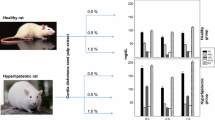Abstract
Extracts of the rhyzome of Curcuma longa are widely used as food additives in India and other Asiatic and Central American countries. Moreover, it has been recently shown that these extracts (“turmeric”), as well as “curcumin” and related phenolic compounds isolated from Curcuma, have a powerful lipid anti-oxidant action, when tested in in vitro systems. This justifies the present attempt to find out whether hydroalcoholic extracts of Curcuma longa also exert an antioxidant effect in human subjects. Our data show that a 45-day intake (by healthy individuals ranging in age from 27 to 67 years) of Curcuma hydroalcoholic extract (at a daily dose equivalent to 20 mg of curcumine) results in a significant decrease in the levels of serum lipid peroxides. These peroxides probably play an important pathogenic role in normal senescence and age-related diseases such as atherosclerosis. Therefore, hydroalcoholic extracts of Curcuma longa (that have very low toxicity and have been cleared as food additives in the above countries) may find use in future preventive geriatrics after further clinical studies.
Similar content being viewed by others
References
Harman, D.: Aging: A theory-based on free radical and radiation chemistry. J. Gerontol., 11: 298–300, 1956.
Harman, D.: The biological clock: The mitochondria? J. Am. Geriatr. Soc. 20: 145–147, 1972.
Miquel, J., Economos A.C., Fleming, J.E., Bensch, K.G., Arian, H., and Johnson, J.E., Jr.: Mitochondrial role in cell aging. Exp. Gerontol. 15: 575–591, 1980.
Henning, B., and Chow, C.K.: Lipid peroxidation and endothelial cell injury: Implications in atherosclerosis. Free Rad. Biol. Med. 4: 99–106, 1988.
Sharma, O.P.: Antioxidant activity of cumumin and related compounds. Biochem. Pharmacol., 25: 1811–1812, 1976.
Toda, S.: Natural antioxidants. III. Antioxidative components isolated from rhizome of Curcuma longa. L. Chem. Pharm. Bull. 33: 1725–1728, 1985.
Ohkava, M., Ohishi, N., and Yagi, K.: Assay for lipid peroxides in animal tissues by thiobarbituric acid reaction. Anal. Biochem. 95: 351–358, 1979.
Bhavani Shankar, T.N., Shanhta, N.V., Ramesh, H.P., Murthy, I.A.S., Murthy, V.S.: Toxicity studies on turmeric (Curcuma Ionga): Acute toxicity studies in rats, guinea pigs & monkeys. Indian J. Exp. Biol. 18: 73–75, 1980.
Author information
Authors and Affiliations
About this article
Cite this article
Ramirez-Boscá, A., Soler, A., Carrión Gutierrez, M.A. et al. Antioxidant Curcuma extracts decrease the blood lipid peroxide levels of human subjects. AGE 18, 167–169 (1995). https://doi.org/10.1007/BF02432631
Issue Date:
DOI: https://doi.org/10.1007/BF02432631




